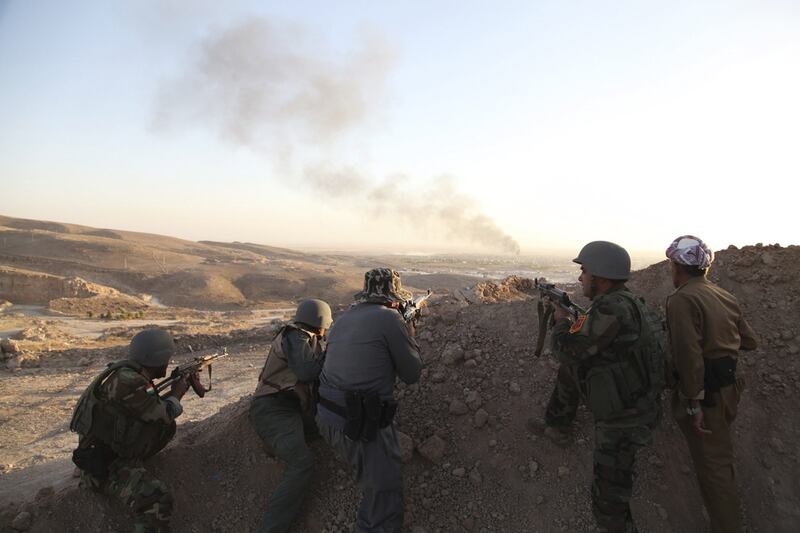In early June, as militants prepared to launch an assault on Mosul, Iraq's second largest city, Prime Minister Nouri Al Maliki appeared primarily concerned with securing a third term in office. Mr Al Maliki ignored the warning signs of a rebellion in the west of Iraq and was instead focused on staying in power.
Mr Al Maliki's prospects of holding on to power have diminished considerably over the past week, as militants from the Islamic State group (IS) routed Kurdish forces, stormed new villages in northern Iraq, and seized control of Mosul Dam, the largest in the country. In response, Barack Obama authorised limited US airstrikes against IS positions, to prevent the militants from continuing their offensive toward Erbil, the capital of the semi-autonomous Kurdish region.
Mr Obama also announced that he had authorised airstrikes to break an IS siege of Mount Sinjar, where tens of thousands of Iraqi Christians and Yazidis, a religious minority group, have taken refuge. US aircraft dropped food and water to the refugees trapped on the barren mountain range in north-western Iraq.
With the IS victories and renewed US military involvement in Iraq, more Iraqi leaders and political factions are abandoning Mr Al Maliki. The prime minister has also reportedly lost the support of his most important ally: Iran. There are many factors underlying the spectacular collapse of the Iraqi security forces and the quick sweep of IS extremists through Mosul and much of northern Iraq. The IS took advantage of the vacuum created by the civil war in Syria, growing resentment among Iraq’s Sunni community against the Shia-led government in Baghdad, and the failure of Iraqi leaders to create a functional political system.
But ultimately Mr Al Maliki bears the greatest blame for the disaster unfolding in Iraq today.
Since he took office in 2006, and especially after his reelection in 2010, Mr Al Maliki has become increasingly repressive and authoritarian. He used the Iraqi security forces to suppress opponents and intimidate his political rivals, installing his cronies in key security posts. He has showed little willingness to make the compromises necessary to lead an inclusive government, and to ease a new wave of sectarian bloodletting. He failed to follow through on power-sharing agreements, refused to include prominent Sunni leaders in his government, and strained relations with the semi-autonomous Kurdish region over oil-revenue sharing deals.
After popular protests swept the Arab world in early 2011, Mr Al Maliki worried about an uprising at home and pledged not to seek a third term in 2014. He also promised to change the Iraqi constitution to impose a two-term limit on future prime ministers. “Eight years is enough for him, in order to not convert to a dictatorship,” Mr Al Maliki’s media adviser, Ali al-Musawi, declared in February 2011. “This is the principle and the concept of democracy.” It soon became clear, however, that Mr Al Maliki had no intention of giving up power.
When the United States invaded in 2003, Shiites made up nearly two-thirds of Iraq’s population of 25 million. Members of the Sunni minority had ruled Iraq since its independence in 1932. The Shiites had waited seven decades for their chance to rule, and it is not surprising that they would consolidate power after the American invasion. But Mr Al Maliki has manipulated a dysfunctional political system, put in place by the United States and the United Nations, to concentrate power and exclude Sunnis.
In many ways, Mr Al Maliki’s personal history shaped his view of politics as a winner-take-all struggle. He was an activist in the Dawa Party, a Shiite Islamist group outlawed and hunted by Saddam Hussein’s regime. Mr Al Maliki fled Iraq in 1979, and lived in exile for 24 years, mostly in Syria and Iran. He became used to the secrecy and isolation of life as a dissident, ever fearful of assassination by Saddam Hussein’s secret police. Mr Al Maliki also grew dependent on support from two governments that used exiles like him as bargaining chips in their battle against Hussein’s regime. He did not like being at the mercy of others.
The Iraqi electoral system is doomed to produce ethnic and sectarian blocs – Sunni Arab, Shia Arab, and Kurdish – that create virtual gridlock in parliament and across the government. In the April parliamentary elections, Al Maliki’s Shia Islamist coalition won a plurality of votes, securing 92 of the 328 seats in the legislature. With his unexpectedly strong showing – Mr Al Maliki’s coalition won three times as many seats as any other bloc – the prime minister quickly began laying the groundwork for another term, even as IS militants were amassing forces near the Iraqi-Syrian border to launch their assault on Mosul.
When peaceful protests broke out in 2012, led by Sunni tribal leaders frustrated by Mr Al Maliki’s policies, he responded with a crackdown: an armed assault on protest camps in Anbar province and mass arrests of Sunnis. Mr Al Maliki managed to alienate Iraq’s sizable Sunni and Kurdish communities, and to empower Sunni militias and extremists.
As Mr Al Maliki struggled to remain in power, he became more dependent on Iran, which is the dominant external power in Iraq. Already, Iran is mobilising to protect the Shia-led government from the growing IS threat. General Qassim Suleimani, commander of the Quds Force of the Iranian Revolutionary Guard Corps, traveled to Baghdad in June to coordinate with Iraqi military officers and Shia militia commanders.
Since the fall of Mosul, Mr Al Maliki has shown no intention of changing his autocratic ways. Iraq needs a new leader who can make compromises and unify a fractured society. It’s time for the highly divisive and sectarian Mr Al Maliki to step aside for the greater good.
Mohamad Bazzi is a journalism professor at New York University and a former Middle East bureau chief for Newsday
On Twitter: @BazziNYU





